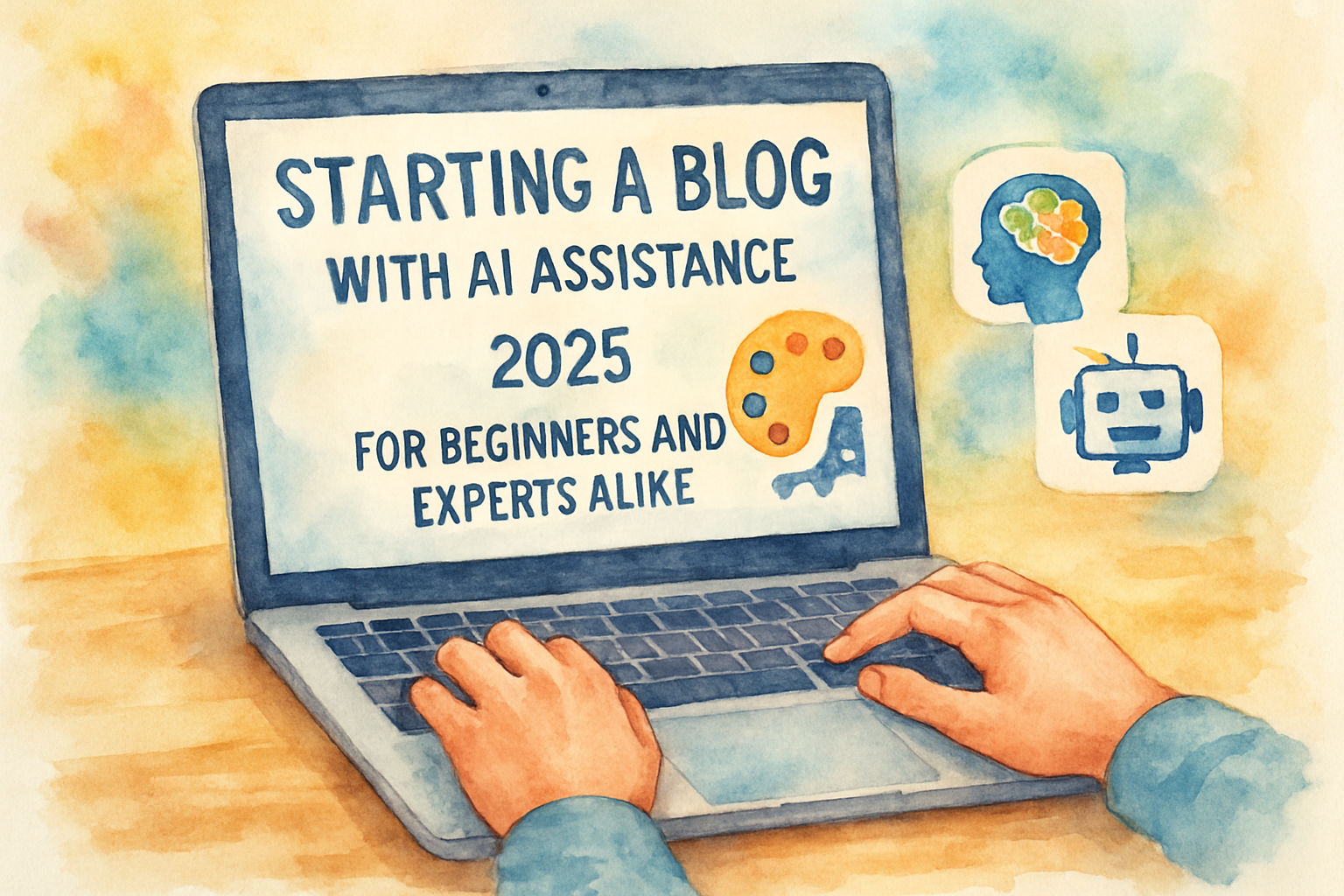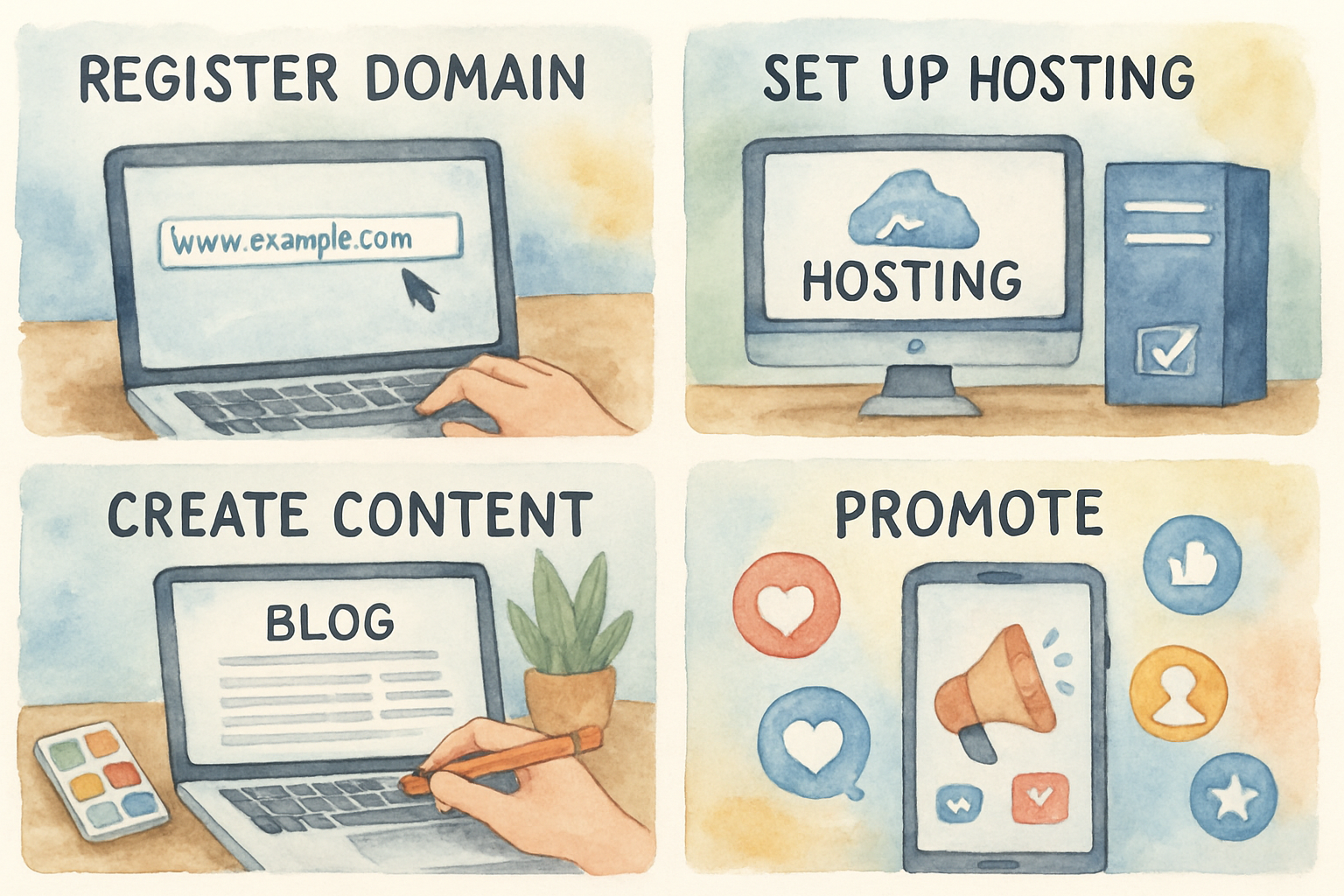Blogging remains one of the most popular ways to share ideas, build a brand, and even earn income online.
Is it too late to start a blog in 2025?
Here’s your comprehensive cheatsheet to starting a successful blog today.
Some are worried the market is saturated.
Some believe you must be a tech wizard.
Some think success requires expert-level writing.
Some assume AI will make bloggers obsolete.
Some doubt it’s worth the time and effort anymore.
Let's dive right in.
Why Start a Blog Now? The Current Blogging Landscape
The question of "is it too late to start a blog" keeps popping up, but the reality is blogging is far from dead. The internet is still expanding, with more people than ever consuming content daily. This growth means your blog has a bigger potential audience than ever before.
New tools and platforms make blogging easier, even if you are not a coding genius. You can build a professional-looking blog within minutes and start sharing valuable stories, tips, and insights immediately. And with platforms like WordPress and hosting providers such as BlueHost, the barrier to entry has never been lower.
AI tools like ChatGPT are transforming blogging, not by replacing bloggers but by enhancing their creativity and efficiency. AI can assist with niche research, generate SEO-friendly headlines, and help write draft content, giving you a competitive edge.
So, far from being outdated, blogging in 2025 is accessible, scalable, and full of opportunities.

Need more proof? Let’s embed a helpful video that busts the myth of 'too late' and shows you practical steps to launch your blog now:
Isn't it exciting how technology is making blogging not just possible but easier and more rewarding?
Common Misconceptions About Blogging
Before we dive into the nuts and bolts of starting a blog, we need to clear up some widespread myths:
- You need to be a professional writer. Wrong. Blogging is about sharing your perspective authentically. Readers enjoy conversational, informal tones that resonate better than rigid academic writing.
- The blog market is saturated. While competition is real, many niches remain underserved. The blogosphere thrives on unique voices and fresh angles.
- Success is overnight. Blogging is a marathon. Consistent effort over time builds momentum.
- AI will replace bloggers. AI is a tool to help, not a replacement for your unique voice and creativity.
- Blogging is too technical for beginners. Modern platforms require minimal technical skills, with plenty of tutorials and support available.
Do any of these doubts hold you back? If so, remember that millions have started blogging successfully by ignoring these myths and focusing on passion and persistence.
Step-by-Step Guide: How to Start Your Blog in 2025
Starting a blog might seem intimidating, but the process is straightforward. Here’s a detailed roadmap to get you from zero to published blogger.
1. Define Your Why and Goals
Knowing why you want to blog will keep you motivated. Is it personal expression, building a brand, sharing knowledge, or earning income? Clear goals help you shape your blog’s niche and strategy.
2. Pick Your Blog Topic and Niche
Find the intersection between what you love, what you know about, and what others want to learn about. Narrowing your niche can reduce competition and establish you as an authority.
3. Choose a Domain Name
Pick a memorable, easy-to-spell domain reflecting your blog topic or personal brand. Use domain checkers to confirm availability. If your ideal name is taken, consider slight variations or personal name options.
4. Select Hosting and Blogging Platform
Self-hosted WordPress is the industry standard for flexibility and control. BlueHost is an excellent beginner-friendly hosting service that bundles domain registration, hosting, and WordPress installation for affordable monthly rates.
5. Set Up Your Blog and Customize
Use WordPress themes to define your blog’s look. Themes like Twenty Twenty-Five offer clean, responsive designs. Customize colors, fonts, and layout without coding knowledge.
6. Create Essential Pages
Include About, Contact, and Privacy Policy pages to establish trust and comply with regulations. These static pages should be easily accessible.
7. Write and Publish Your First Posts
Start with helpful, engaging posts answering your audience’s questions. Use headings, images, lists, and keep paragraphs short.
8. Promote Your Blog
Leverage social media channels like Facebook, Twitter, Pinterest, and Instagram. Engage with other bloggers and your audience through comments and collaborations.
9. Monitor and Improve
Use Google Analytics and Search Console to track traffic and performance. Regularly update content and optimize for SEO.

Feeling overwhelmed? Don't worry, many successful bloggers felt the same at first. The key is to take one step at a time.
Choosing Your Blog Niche: Passion Meets Purpose
Your niche is your blog’s heartbeat. It should fuel your writing and connect with readers. Here’s how to find yours:
- List topics you think about daily or are passionate about.
- Consider issues you frequently research or discuss.
- Look at your skills or life experiences that offer value to others.
- Analyze the competition and find gaps you can fill.
- Test ideas by writing small posts to gauge interest.
Example: Instead of a broad "food blog," consider "quick vegan meals for busy professionals". This specificity helps target a dedicated audience.
Don’t stress about expertise—readers prefer relatable voices who share real experiences and learn alongside them.
SEO and Promoting Your Blog Effectively
Getting traffic to your blog is crucial. Here’s how SEO and promotion work hand in hand:
Search Engine Optimization (SEO)
SEO boosts your blog’s visibility on search engines.
- Research keywords related to your niche.
- Incorporate those keywords naturally in titles, headings, and content.
- Use meta descriptions that entice clicks.
- Optimize images with alt text.
- Use internal linking to connect relevant posts—for example, linking to the ultimate guide for writers to help readers explore more blogging platforms.
- Regularly update and improve content based on performance data.
If SEO sounds technical, plugins like Yoast SEO simplify the process within WordPress.
Promotion Strategies
Promotion increases awareness and drives targeted traffic. Key tactics include:
- Sharing blog posts on social media with hashtags.
- Engaging in blogging communities and commenting on related blogs.
- Building an email list for direct communication.
- Collaborating with other bloggers on guest posts or challenges.
- Using Pinterest strategically, which is a visual search engine that can propel traffic quickly.
- Participating in forums relevant to your niche.
Consistent promotion and SEO together build a sustainable audience over time.
Monetization Strategies: Turning Your Blog Into Income
Many new bloggers wonder, "Can I make money?" The answer is yes, but it takes strategy and patience.
Common Monetization Methods
- Display Advertising: Platforms like Google AdSense place ads on your blog and share revenue based on clicks or impressions.
- Affiliate Marketing: Promote products and earn commissions when readers purchase through your links.
- Sponsored Content: Write posts for brands looking to reach your audience.
- Sell Products or Services: Digital goods like eBooks, video courses, and memberships are popular options.
- Consulting or Coaching: Use your blog as a portfolio to attract clients.
Monetization generally comes after consistent content creation and audience growth.
For a deep dive into monetization methods, check out detailed resources on our main blog page.
Tips for Long-Term Blogging Success
Here’s how to keep your blog thriving well beyond launch:
- Consistency is key: Aim to publish at regular intervals. Weekly posts are a good starting point.
- Engage with readers: Respond to comments, ask questions, and build a community.
- Diversify content formats: Mix blog posts with videos, podcasts, infographics, and interviews.
- Keep learning: Blogging evolves. Consider ongoing education in SEO, marketing, and content trends.
- Use analytics: Track what works and refine your strategy accordingly.
- Protect your site: Regular backups, security plugins, and updates keep your site safe.
- Manage your time: Set realistic goals; avoid burnout by pacing your efforts.

Conclusion and Your Next Steps
So, is it too late to start a blog? Absolutely not. If you have passion, patience, and a plan, blogging can be a rewarding journey at any time.
You don’t need to be a tech pro or professional writer. You need your unique voice and the dedication to share it consistently.
Remember the value of starting now: learning as you go, making connections, and growing steadily.
Ready to get started? Don’t hesitate. The sooner you launch, the sooner you build your audience.
For more detailed guidance on platforms and technical setup, consider exploring the ultimate website builder guide, ensuring the tech side is as sleek as your content.
What's Your Next Step?
Tell us in the comments: How will you apply this to your blogging journey? For personalized advice, contact us!
(Verified with sources as of 2025-08-14)
For entrepreneurs looking to expand your startup’s reach with effective digital strategies, check out this comprehensive pre-seed startup guide which can guide your venture’s online branding and outreach.